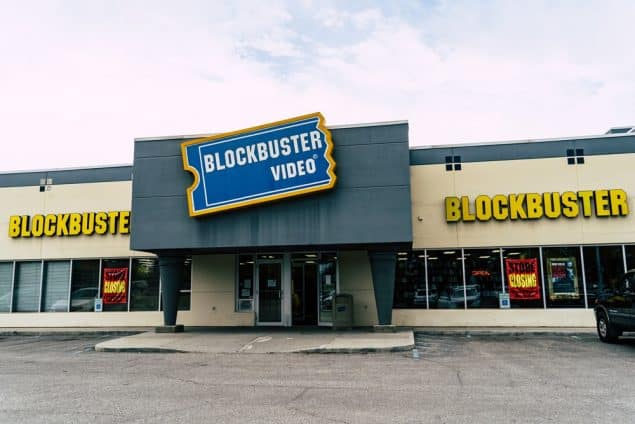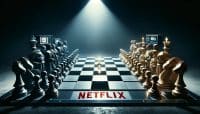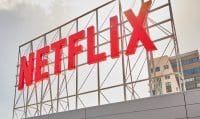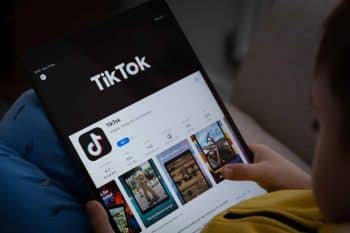Home » Spotlight • US business news » Blockbuster Refused $50m Netflix Buy-out – And Then Went Bust
Blockbuster Refused $50m Netflix Buy-out – And Then Went Bust
https://www.whatjobs.com/news/usa/us-business-news/blockbuster-refused-netflixs-50-million-buy-out-offer-and-then-went-bust

By Hugh Fort in Spotlight, posted February 20, 2024

In 2022, movie fans have hundreds of films at their fingertips from services like Netflix and Amazon Prime.
Within seconds they can stream whatever they like - the classic, 80s nostalgia and an endless stream of Netflix, HBO, and Amazon Prime originals.
Around 20 years ago, the process was totally different.
Read More: The Company Who Dared Fraudsters To Steal CEO’s Identity – And They Did
For readers aged under-30, there were things called videos.
Videos were hard, plastic rectangles with tape inside.
You'd put them in a video player and watch a film.
The quality was garbage compared to the modern world of HD.
They were replaced by DVDs, which were, in turn, replaced by the streaming services of today.
One of the leading video and DVD suppliers was Blockbuster, which operated a rental service.
You'd pay for a video for a few days, watch it, rewind it and return it. Pretty simple.
In 2000, Netflix offered Blockbuster the chance of hosting its online offering, with Blockbuster running Netflix's brand stores.
Read More: The Man Who Sued Bank Of America For More Money Than There Is In The World
Netflix was then a DVD service offering where people would rent movies by mail at a flat rate with no late fees.
Netflix offered its services for around $50 million.
This was in spite of its initial success coming from luring customers from Blockbuster, who were fed up with being charged around $1 a day for late returns.
Netflix was created after boss was hit with Blockbuster late fees
Founder Reed Hastings has publicly stated he had the idea to start the company after having to pay $40 in Blockbuster late fees.
Speaking to CNET in 2010, former Netflix CFO Barry McCarthy said the negotiations didn't go well.
He said: "I remembered getting on a plane, I think sometime in 2000, with Reed [Hastings] and [Netflix co-founder] Marc Randolph and flying down to Dallas, Texas and meeting with (Blockbuster CEO) John Antioco."
"Reed had the chutzpah to propose to them that we run their brand online and that they run [our] brand in the stores and they just about laughed us out of their office.
Looking to boost your online brand? Create your FREE business profile at WhatBiz? here.
"At least initially, they thought we were a very small niche business.
"Gradually over time, as we grew our market, his thinking evolved, but initially they ignored us and that was much to our advantage."
CNBC looked at the saga in 2020.
Blockbuster was $1 billion in debt
Blockbuster added its own online rental service called "Blockbuster Total Access" in 2006, which led to Netflix losing 55,000 subscribers.
However, the company had around $1 billion in debt, which eventually led to its demise.
But the two waged an epic battle.
Hastings admitted to reporter Gina Keating in 2009: "If it hadn't been for their debt, they could have killed us.
A big row on the board of Blockbuster followed, where Wall Street billionaire Carl Icahn had bought a nearly 10 percent stake in the company.
Icahn wanted to build out the online business and fight the decision from CEO John Antioco to remove late fees - a big earner for the company.
Another blowup happened in 2006 when Antioco was due an annual bonus of $7.6 million.
Icahn felt this was far too much and started pushing toward removing the CEO, who eventually left in March 2007.
Antioco left with $5 million, plus a $3 million bonus.
Read More: Netflix Has Lost 1,600 Staff So Far This Year
Icanh installed former 7-Eleven boss James Keyes, who wanted to focus on growing revenue to pay off the debt.
This meant moving away from the online business and back to brick-and-mortar stores.
The late fees returned in 2010.
Blockbuster went bankrupt in 2010
The financial crash of 2008 presented a significant issue to Blockbuster, as its massive debt remained.
Banks were far more reluctant to lend big money to companies, ultimately leading to the company's capitulation.
Speaking in 2018, Keyes said the inability to secure Wall Street funding was the "death blow" to Blockbuster.
The company, unable to pay off the $1 billion debt, filed for bankruptcy in 2010.
The same year Netflix hit 20 million subscribers in the US and started expanding overseas.
In a piece for Harvard Business Review, Antioco said: "I firmly believe that if our online strategy had not been essentially abandoned, Blockbuster Online would have 10 million subscribers today, and we'd be rivaling Netflix for the leadership position in the internet downloading business."
Need Career Advice? Get employment skills advice at all levels of your career
However, Antico came out of the collapse smiling, as he sold his Blockbuster shares when he left in 2007.
What did he invest them in? Netflix.
He wrote: "I could see that Netflix was going to have the whole DVD-by-mail market handed to it, along with a direct path to streaming movies into homes—which is exactly what Netflix has done.
"I thought I was a genius when I sold my shares at about $35.
Icahn said his decision to invest in Blockbuster was "the worst investment I ever made" in another piece for Harvard Business Review.
He wrote: "To this day I don't know what would have happened if we'd avoided the big blowup over Antioco's bonus and he'd continued growing Total Access.
"Things might have turned out differently."
Follow us on X, LinkedIn, and Facebook














